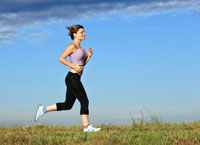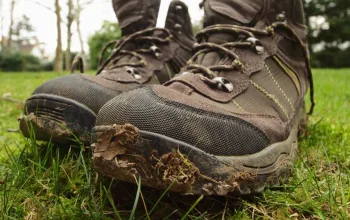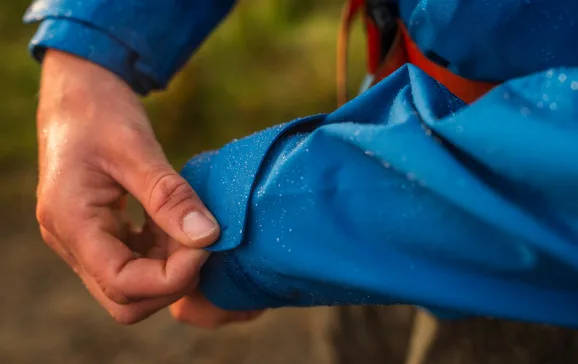Myth? The more you sweat the less fit you are
Pit patches don’t do much for your sex appeal, but getting sweaty doesn’t necessarily mean you’re out of shape. ‘The fitter you are the quicker your body responds to exertion,’ says Tim Allardyce, of The Sports Injury Clinic (thesportsinjuryclinic.com). ‘You need to sweat in order to prevent yourself from overheating, so it’s not an indicator of lack of fitness.’
Myth? You should drink at least eight glasses of water a day
Bottled water manufacturers must chuckle gleefully each time this myth gets another airing, and we bet they don’t celebrate their ever-growing profits with a glass of still or sparkling. But now it’s time to reveal the truth: ‘You do need about that much liquid intake each day, but it needn’t be in the form of a glass of water – food counts too,’ says registered nutritionist Carina Norris, author of You Are What You Eat: The Mealplanner That Will Change Your Life (Virgin, £9.99). ‘Soup, for example, contains lots of liquid, as do most fruits – this all contributes towards your liquid intake.’
Myth? Muscle turns to fat if you don’t exercise
Lack of exercise would be a handy excuse for that ever-expanding doughnut hanging over the top of your trousers, but you have only your appetite to blame. The only thing that can make you fat is overeating. ‘What usually happens is that someone who’s fit eats a lot, then they stop exercising but keep eating the same quantity,’ says Carina. ‘The result? They get fat.’
Myth? You should never eat before a swim
There’s no evidence that people get cramps more easily if they eat just before getting wet, although it is true that blood is diverted to your stomach for digestion. ‘The most likely result of swimming on a full stomach is indigestion,’ says Carina, ‘as your body uses a lot of energy to digest but will also need to supply your muscles with nutrients to keep you afloat.’
Myth? Shaving makes hair grow back coarser
Fear not cyclists, you can still shave the hairs off your legs and seconds off your time. Whether it be wax, a razor or cream, there’ll be no permanent change to your hair’s structure. ‘A hair tapers off at the end and so when you shave it, initially the tip is more blunt making the hair shaft appear thicker and coarser, but there’s no real change,’ says Nichola Joss, of Braun, a company that has been making electric shavers since 1950. ‘Within a few weeks or so each hair will look and feel the same as it did before.’
Myth? Reading in the dark ruins your eyesight
There’s no evidence that nocturnal reading, whether under the bed clothes or energy-saving low-wattage light bulbs, does any permanent damage to your eyes. ‘Reading in the dark or a dimly lit room won’t cause you to become near- or long-sighted, nor can it make you blind,’ says Dr Glenn Carp, of London Vision Clinic (londonvisionclinic.com). ‘But because poor light levels reduce the contrast between letters themselves and the page they’re printed on, the eye muscles need to work a lot harder in an attempt to resolve the letters they are attempting to see in the dark. And that may cause temporary eye strain.’
Myth? Brown bread is healthier than white
Use your loaf and read the label. ‘Brown bread is often made with white flour and simply dyed brown,’ says Carina. ‘Like white bread, it has to have nutrients added – the government stipulates that white and brown flour must be fortified with B vitamins, iron and calcium. For natural goodness from your bread, opt for wholegrain instead, which keeps you feeling fuller for longer as it’s a better source of fibre, as well as other nutrients such as vitamin E and B.’
Myth? Chicken is the healthiest meat
There’s no escape from the obesity epidemic, it seems, with chickens now under fire for being overweight and flabby. ‘Some chickens have as much fat as red meat, which isn’t usually considered particularly “lean”,’ says Carina. ‘It depends on how they’re reared, whether they’re allowed to move around and what type of breed they are. Dark meat is higher in fat than light meat, and meat from chickens that don’t get the opportunity to exercise is fattier than that of free-range birds. The “healthiest” meats are free-range poultry, venison, rabbit, hare, as well as game birds such as partridge or pheasant – these animals are able to move around, so build more muscle and less fat.'
Myth? Being cold will give you a cold
Strictly speaking you can’t ‘catch’ a cold just by being wet or cold, but according to research from Cardiff University, being chilly can give a dormant cold virus enough strength to hit you for six. A person can harbour two or three cold viruses in their body at any one time, and then when their body is weakened via a low body temperature, for example, it can give the virus the opportunity to multiply, resulting in the sniffles for you.
Myth? Chewing gum stays in your digestive system forever
Your parents would have used any excuse to stop that incessant chewing and now you’re probably using the same old wives’ tale to get your kids to spit out their gum. But although gum doesn’t contain much in the way of nutrition, it should pass through your gut along with indigestible unchewed seeds and sweetcorn husks says Carina.
Myth? If you cut more calories, you shed more fat
Unfortunately, there are no short cuts to losing weight, regardless of what those back-page ads in fitness magazines claim. ‘If you eat less than approximately 1,200 calories per day (for a man); or around 1,000 calories (for a woman), your body goes into “starvation mode”,’ says Carina. ‘It thinks food is scarce and so tries to store fat rather than use it up as energy. The result is that you get lethargic and weak, and as soon as you start eating a normal amount again you’re more likely to just pile everything right back on again.
Myth? Antibacterial soap kills more bacteria
It sounds logical, but according to researchers at Columbia University School of Nursing, US, the number and variety of bacteria left on your skin after washing with antibacterial or standard soap is identical. So how can you wipe out those germs? Count at least 15 seconds as you wash – the length of time you spend washing correlates with how bacteria-free your hands are afterwards.
Myth? Butter and cream are bad for you
Just as your grandfather said – everything in moderation, and that includes dairy fats. ‘Butter and cream are excellent sources of conjugated linoleic acid, a natural and healthy fat that helps prevent cancer,’ says Carina. ‘They are, however, also high in saturated fat, the kind that increases your level of the harmful kind of cholesterol. And all fats are highly calorific – so keep your intake to 70g per day or less.’
Myth? Crunches will give you a six-pack
If you’ve got a layer of fat on your belly, even the strongest of six-packs won’t be able to reveal itself. ‘Everyone has a six-pack hidden somewhere under their flesh,’ says Tim Allardyce. ‘The only way to make it visible it is to lose weight. You can improve and define the abdominal muscles once they’re visible but you can’t make them magically appear with crunches.’
Myth? Drinking coffee will sober you up
Coffee will improve your concentration but even the strength of a triple espresso can’t remove the alcohol from your body. Alcohol leaves your body relatively slowly at a rate of approximately one unit per hour – that’s half a pint or a 125ml glass of wine. About 10 per cent of the alcohol leaves your body via your breath, urine and perspiration (eau de hangover, anyone?) and the rest is metabolised or digested just as food is.



 Hit or myth?
Hit or myth?
















